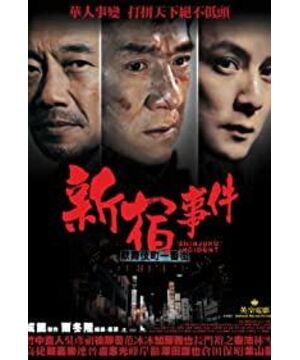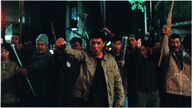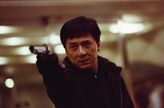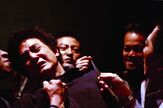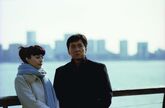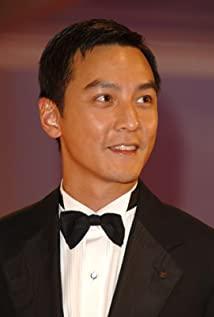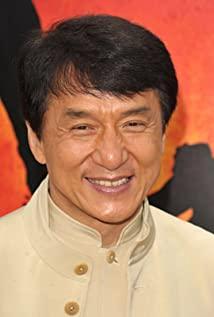─ The shadow extension of "Mong Kok Night": "Shinjuku Incident"
allows us to imagine: tear off the cover photo of "Shinjuku Incident" "Apologize! Apology!" The portrait of Jackie Chan clenching his fist in the direction of two o'clock is torn off, and the upper CITIC Fist starts his hand The back of the confrontation with the crowd is probably another version of the stills of "Mong Kok Night". The gang members of "New" are taken from "Wang", how can the MK atmosphere not test the experience of the audience - if the camera does not move up half a point, everyone can't tell whether the background is Japan or Hong Kong, whether it is Shinjuku or Mong Kok. Everyone is puzzled by the rapid pace of "New", the death of Aberdeen has become a sports topic (how can it be so coincidentally accurate?), or even because the director cruelly cut out Ajie (Daniel Wu) in the trailer "Tokyo" This place is a strange place.” Why did Tietou (Jackie Chan) fail to use his skills and make a fool of himself...and so on. We have to suspect that "Xin" is the second part of "Wang" on the theme of "Foreign Land" (Laifu and Tietou).
The most dull part of "Wang" is when Laifu (Daniel Wu) and Dandan (Cecilia Cheung) are sweet. The way Laifu and Tietou meet new love or re-encounter old love obviously has a more mature arrangement: those in "Wang" can be used as a breathable position for the audience to watch at first glance, but in "New" it is almost zero, and the audience thinks that The easiest (a date on the shore of a sunny day) turned into a life dilemma of "I want a brother or Lili (Fan Bingbing)", or it became a Japanese translation machine, bargaining with Kitano (Naoto Takenaka) in the Ozayuan. The most disappointing thing for the female audience is that Tietou declined Lili's rudeness to continue to translate. Well, of course we miss Laifu's eyes and tenderness.
The director is so determined to abolish the shadow of the old corner in "New"! If the female idol Wu Yanzufu loses his hand at the beginning, and at the end becomes a drug addict who helps others to help themselves, this kind of plot arrangement is only for the main reason of enriching Tietou's end. Poor Ajie only fulfills the image of Tietou (both affection and love). A big supporting role, I believe that there are no girls who don't hate iron heads. Love is hard to come by in the gangster world. Don't complain that happiness is cruelly defined as living well. Although Tietou is suspected of "hooking the second sister-in-law" - of course, the second sister-in-law was originally his lover, but he also saw that Xiuxiu (Xu Jinglei) is no longer Xiuxiu , and also called Yuko and Eguchi (Kato Masaya) to have a daughter, what can I say. I can't forget the "Second Sister-in-law", it was just the result of a misunderstanding, which is excusable, the movie didn't make a big deal about it, but Tietou didn't necessarily treat Lili kindly because of it. Dandan of "Wang" and Lili of "New" are/was a prostitute and a lover in a foreign land. The characters' names even have the same vowel, but their fates are completely different: the former went back to his hometown because his lover was killed, and the latter was killed. Tietou abandoned and was not involved in the gang's cycle of vendetta, and continued to be the bar owner.
In "New", a local policeman and a foreign gangster are friends through adversity. The foreign gangster's way of making a living is still the same as in "Wang", and they want to assassinate underworld dignitaries. The rhythm of the iron-headed "Friends" in "New" is over in a flash. The first scene should be combined with the outside world, and the second scene of street greetings is much more successful than Laifu in "Wang" who constantly evades the police. What is unforgettable is that Kitano let go of Tietou several times, and the two sympathize with each other using each other, which is more wonderful than the black-and-white undercover master-slave relationship of "Wang". Here, I have to mention Lin Xue. Remember Mou Weibin (Lin Xue), who only appeared in three acts in Chen Musheng's "Three Chasing Crosses". In the first scene, when he promised Sun Zhaoren (Aaron Kwok) to collect intelligence, the camera CLOSE UP showed him biting egg tarts, drinking milk tea, and swaying his beard. To Sun, the third scene where he was buried near the concrete stairs by the pier. His death is surprisingly subdued under the lens of "Three." From the promotion of Du Qifeng to the appointment of Chen Musheng and Er Dongsheng, Lin Xue has become a conventional black and white actor in police and gangster movies. In "Prosperity", Lao Liu wears the kind of flower shirts that can be easily bought in Huayuan Street, and the image is pure money-making, and when he arrives, he is an old ghost with a time-honored line and plays a role in the "New" Dazayuan. Unfamiliar and fresh to Hong Kong audiences The Tianjin accent, which was quietly set off from the appearance to the disappearance, suddenly came to Aberdeen (Qian Jiale) and slashed his throat, which became the most terrifying and most sympathetic death in the audience. Aberdeen accidentally killed the old ghost upstairs in the company. The besiegers downstairs happened to be about to declare war. Falling to the ground; the stones poured in, the iron head fell to the ground, and crawled towards the old ghost and Hong Kong Aberdeen when he fell and touched, and he was exhausted. From the old sixth to the old ghost, they are also the role of the gangster core area, and "Xin" is obviously different from "Wang". In the final analysis, Er Dongsheng still sympathizes with the strangers in the city who have to fall for the grass.
Let's look at the "Shinjuku Incident" created by local people: "City Hunter" Meng Bo in the "Beauty News Reporter" series exposes the image of the unliterate hero in Shinjuku's underworld colluding with politicians, "20th Century Boys" girl Canaan in a Chinese family in Shinjuku During his part-time job at the restaurant, he came across a new heroic image of the disputes between China and Thailand, and successfully stopped it. Er Dongsheng obviously used his experience in Mong Kok to shoot Shinjuku. Even if it is only an extension of his personal shadow, many of the same generation of creators are still only watching the dust. After all, the theme of a foreign land should be interpreted by a foreigner who was a screenwriter.
(recorded in "Great Myopia")
View more about Shinjuku Incident reviews


